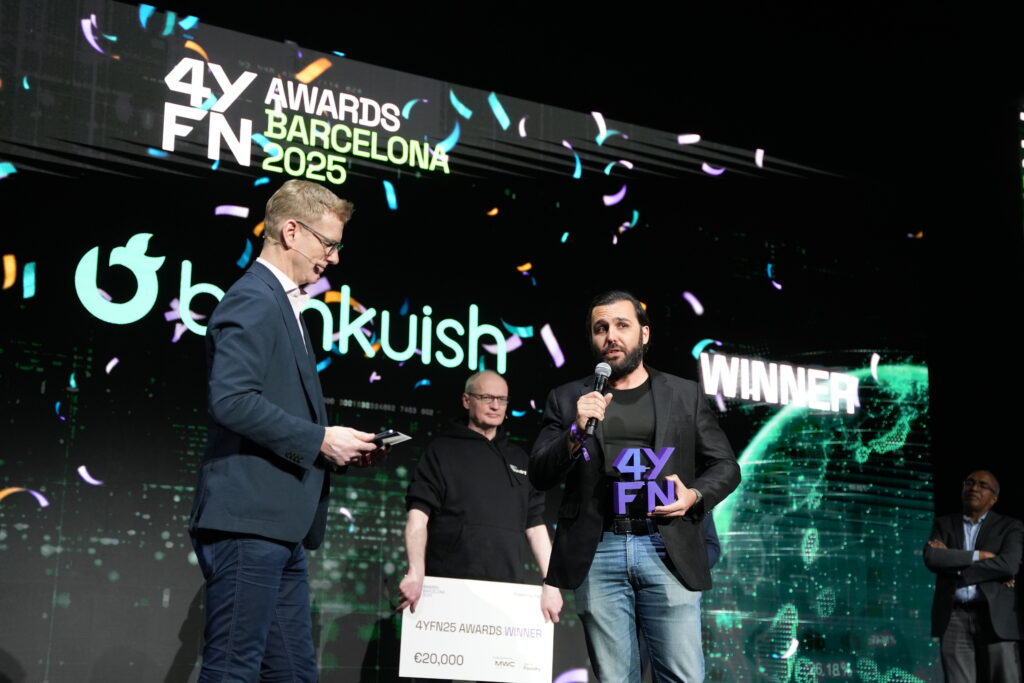Every year, the 4YFN Awards spotlights the most groundbreaking startups making waves in the global tech ecosystem. At 4YFN25, that honor went to Bankuish, an American fintech on a mission to reshape financial inclusion for gig economy workers and freelancers.
We caught up with José V. Fernández, Bankuish’s CEO, to discuss what winning the 4YFN25 Awards means for their team, how they’re shaping the future of work, and their goals going forward.
For those new to Bankuish, tell us about the company:
Who are the key people behind it?
I am the Founder and CEO of Bankuish. I started in the industry leading a series of fintech startups looking to bridge the gap between reputable financial institutions and underserved communities, including Atlas Money, Access Network, and FiClub. Before becoming a founder, I led risk departments and underwriting teams at several banks, such as ING Direct and Banesto.
Today, our team of 50 spans 12 countries with headquarters in Miami, Mexico City, and Sao Paulo. Our leadership team, like Sergio Souza (Brazil, Director of Analytics), Tomas Delrivo (Argentina, Marketing Director), Adriana Galarza (Colombia, Director of Product) or Bruno Manchinelli (Argentina, Director of Mobile) bring their breadth of expertise from their executive roles in industry leaders such as Itaú, Santander, MercadoPago, SAP, ABInbev, etc.
Being from different geographies, we are a very diverse team, but with a clear common purpose: Bringing dignity to the financial lives of independent workers.
When did you launch, and what is your mission?
Bankuish was born in March 2020 to be the credit bureau of the future of work. Our mission is to bring dignity to the financial lives of independent workers. We turn gig worker, freelancer, and creator data into a creditworthiness profile currently used by some of the largest banks in the world.
By connecting independent workers to tailored financial products, insurance, and benefits programs, Bankuish empowers them to access the financial support they need to thrive without constraints.
Congratulations on winning the 4YFN25 Awards! How does this recognition and resulting opportunities impact your team and your vision for the future of Bankuish?
Thank you! It’s truly an honour.
But being recognized as the 4YFN Startup of the Year is more than just an award—it’s a powerful validation of our mission: to bring dignity to the financial lives of the future of work. Whether they are delivery drivers, app-based workers, freelancers, or content creators, they deserve better financial access and opportunities.
This award also legitimizes alternative credit scoring models and highlights the urgent need for large financial institutions to adopt fairer, data-driven creditworthiness models. It encourages us as a company to dream bigger and bolder and be the change that gig workers deserve.
How was your experience at 4YFN25? Did you make any particularly surprising or valuable connections?
Beyond exposure, we solidified our thought leadership in AI-driven fintech. This event showcased how banks and financial institutions can ethically tap into the half-a-trillion gig economy market while driving measurable social impact—a narrative that resonates with global stakeholders.

We engaged in numerous meaningful conversations with potential partners and investors excited by our approach. It’s been a great platform to demonstrate how our alternative credit score can bridge the gap between gig workers and traditional banking.
We will always be thankful for the support from 4YFN exhibiting companies, such as our investors Wayra & Telefonica, and our clients like Santander for their enormous support throughout our journey and for believing in what Bankuish can do.
4YFN is clearly the most important gathering in the world right now for tech companies looking to work with large corporations, like in our case.
With the 4YFN Awards focused on market-changing startups, what are the biggest changes the gig economy, freelance, or banking industry needs right now, and how are you contributing to that?
There is an urgent need for large financial institutions to adopt fairer, data-driven creditworthiness models. With the gig economy projected to grow at a 16.18% CAGR annually through 2031 and the creator economy already surpassing $104 billion, the demand for fair and tailored financial solutions has never been greater.
Bankuish has already originated more than $400 million in fair financial products for the protagonists of the future of work.
The adoption of AI is the other major change in the fintech industry. The advent of AI has brought upon an explosion of new types of freelance work around the technology that are quickly joining the ranks of highly skilled, highly paid contractors that get rejected from fair financial products due to their lack of traditional monthly salaries. Bankuish is already in conversations with organizations like OpenAI to help the earners within the marketplaces being born around AI to have access to better banking. At Bankuish, we are also at the forefront of technology ourselves, with our AI-enhanced credit score and our financial assistant for independent workers, “AImee”.
The €500 million investment in AI development in Spain, announced at 4YFN, is a clear signal of the transformative power of this technology. For us, this is a major boost and inspiration to continue innovating and enhancing risk profile analysis.
As the CEO of Bankuish, how has your approach to leadership evolved since launching?
My approach to leadership has evolved dramatically during the last five years leading Bankuish. Initially, my focus was around conveying our company’s mission to our key hires, which, for a startup, are all of the initial hires. As these early hires began to build their teams, culture came to the forefront of my leadership style.
I strongly believe that the only thing that gives a startup an edge over its bigger competitors is their culture—in our case, that is a culture focused around urgency, innovation, and accountability while keeping our mission to bring dignity to the financial lives of the future of work at the center of everything we do.
We don’t just write down our culture; we live and breathe it every day at every level. This ensures we build proactive teams looking for better ways to serve our users, who help each other but own their mistakes. More importantly, it creates an environment where great people want to come and create something new and better with you.
The fintech sector is growing rapidly, arguably more than traditional banking, so how do you stay ahead of industry changes while maintaining your competitive edge?
The beauty of being a fintech startup is our ability to stay in direct contact with consumers, allowing us to develop solutions that address real market needs. Our approach to product development is centered on solving genuine customer pain points, which not only enhances their experience but also contributes to the evolution of the financial sector as a whole.
By driving innovation, we help shape a more efficient and customer-centric ecosystem—one that benefits not just individuals but also financial institutions looking to adapt and better serve their clients in an ever-changing landscape.
What are your goals for Bankuish in the coming year? Any specific milestones or expansion plans you’re excited about?
We are thrilled to continue exploring expansion plans into new markets, such as Canada, Europe, and Asia. The lack of financial inclusion for independent workers is a worldwide problem, and Bankuish has proven its capabilities to adapt to new markets, understand the difficulties of our users, and use the opportunities in favor of them within each country where we operate.
We will continue investing in our technology development, including our AI fintech assistant AImee, our synthetic data models, and alternative credit score (the Bankuish score) to maintain our leadership position.
Building a startup is filled with highs and lows. What’s one thing you’d tell yourself at the very beginning of founding Bankuish?
Do you care enough about your mission that if you knew you would fail, you would try anyway?
When I founded Bankuish in March of 2020, in the middle of the pandemic, as a solo founder, the journey was difficult and lonely. It took many long and solitary months to build the prototype and find the first clients and investors. I burned past my budgeted savings without revenue, and self-doubt was affecting my pitching and strategies. It took me too long to understand that the journey is all that matters. Bringing dignity to the financial lives of gig workers is a worthy journey and once I acknowledged it, every day I get to spend advancing this mission feels like a success.
Now, I tell my team every day: Failure is an option. If we fail as a company but pave the way for the right banking industry changes, we will have succeeded. This empowers us to build bold new solutions and makes for a fun journey all together.
And finally, what advice would you share with new entrepreneurs also starting out in banking, fintech, or the future of work?
I would say to those new entrepreneurs to validate their ideas early by testing real user demand before building. Fintech and the future of work are heavily regulated, so understanding compliance in each market and partnering with licensed entities can save time.
A solid business model matters—focus on who has the biggest incentive to pay, what the best value proposition is for them, and ensure your unit economics work before scaling. Embedded finance and data-driven insights can create strong moats, but trust and transparency are key for monetization.
Finally, think globally but adapt locally—each market has unique financial and socioeconomic behaviors and regulations that require careful navigation.


- Barcinno Startup Interview: 4YFN24 Award Winners Qilimanjaro Quantum Tech
- Barcinno Startup Interview: 4YFN23 Award Winners Payflow








Leave a Reply